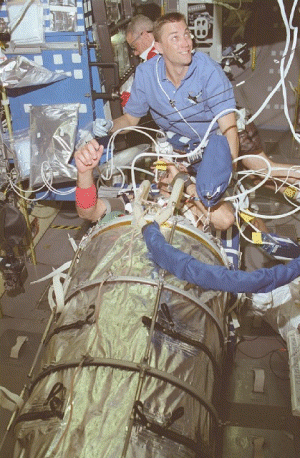For science the microgravity has a great value because there physical, chemical and biological processes can be studied without the influence of gravity.
Without gravity everything is different. Many of the mentioned processes are functioning in a different way than on Earth.
Materials science
Microgravity influences above all the behavior of liquids and melts, because lighter (better: less dense) material doesn't rise any more (there is no up and down).
Flames behave differently due to the same reason.
That's why scientists melt metal probes in space an mix them with others, to observe the behavior during the mixing. There they have found out that despite the missing gravity not all materials can form alloy.
No warmer material is rising, so a normal boiling pot would not work in space, because the heated water would not rise from the heater and therefore not mix with the cold water. This process is called convection and is caused by gravity, therefore it is missing in space.
|
Both pictures show astronauts doing scientific experiments on the Neurolab mission in 1998, in which mainly the influence of zero gravity on the human body was studied. Among other things they performed experiments concerning the hand-eye coordination, the regulation of the blood pressure and sleep monitoring.
The effects of weightlessness on the human body |
Likewise small bubbles can be distributed in liquids to form extra light or isolating materials. This aspect of zero-g could contain big options for industrial production in space in the future. As well solids can without problems be distributed in a liquid material which then soldifies.
Biology and medicine
|


